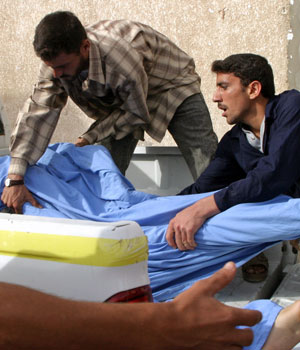
Men load the bodies of police recruits onto a police vehicle after a suicide bombing in Fallujah, May 3, 2006 (REUTERS)
BAGHDAD, Iraq (AP) – A suicide bomber blew himself up while standing in a line of recruits outside Fallujah’s police headquarters on Wednesday, killing at least 15 people and wounding 30, in an attack aimed at discouraging Sunni Arabs from joining the force, police said.
Thirteen of the dead were recruits and two policemen, said police 1st Lt. Omar Ahmed.
Police also found the bodies of 14 Iraqi men in Baghdad who apparently were the latest victims of a wave of sectarian violence involving death squads that kidnap civilians, torture them in captivity and dump their bodies on city streets.
The attack in Fallujah, a former insurgent stronghold 65 kilometers (40 miles) west of Baghdad, was part of an insurgent campaign against U.S. efforts to bring more Sunnis into the police and army.
The bomber, dressed in civilian clothes, struck outside the entrance of the police building, police said. His hidden bomb exploded several minutes after he joined the crowd of recruits waiting to enter the building and apply for jobs, Ahmed said.
On Tuesday, the bodies of four Iraqi soldiers were found in the insurgent stronghold of Ramadi, two days after they graduated from basic training as part of the first all-Sunni class, according to police. Ramadi, the capital of Anbar province, is 50 kilometers (30 miles) west of Fallujah.
In other violence Wednesday: A roadside bomb exploded in an outdoor market in northern Baghdad, wounding 16 civilians, said police Maj. Raid Moussa.
Gunmen attacked a police patrol in central Baqouba, 60 kilometers (35 miles) northeast of Baghdad, killing a police officer and wounding another, police said.
A roadside bomb exploded near an elementary school for girls in Tikrit, 130 kilometers (80 miles) north of the capital, wounding one child, said policeman Hakim al-Azawi.
In Baghdad, as Iraq’s parliament met Wednesday for only the third time since it was elected last year, parliament speaker Mahmoud al-Mashhadani, a Sunni Arab, urged the lawmakers to be “the healers” of Iraq’s deep sectarian divisions.
Prime Minister-designate Nouri al-Maliki, a Shiite, is in the process of choosing a Cabinet for the new unity government from Iraq’s complex mix of political parties controlled by majority Shiites and minority Sunni Arabs and Kurds.
Al-Maliki was officially appointed on April 22 and has pledged to complete his Cabinet this month. That will be the final stage in establishing the new government.
U.S. officials believe a unity government can over time calm sectarian tensions and lure many Sunnis away from the insurgency. But on Tuesday, Shiite officials reported a new snag in the negotiations hen Sunni politicians insisted on key posts, including deputy prime minister and a major ministry such as finance or education. Shiites, who hold 130 of the 275 seats in parliament, offered a lesser ministry but the Sunnis refused, according to Shiite politician Bassem Sharif. Talks were to continue Wednesday, he said.
Sunni politicians are also eager for parliament to consider amendments to the new constitution. Sunnis oppose several provisions, including one allowing formation of regional governments. Many Sunnis fear that would lead to Iraq’s breakup and deprive them of a fair share of the country’s vast oil wealth.
Shiites and Kurds agreed to study changes in the constitution during the first four months of the new parliament. However, Shiite officials said Tuesday they want to delay formation of the committee to study changes until the new Cabinet has been chosen.
The issue was to be discussed during Wednesday’s parliament session. Officials have said curbing violence is a top priority of the new assembly.
On Tuesday, Anbar Gov. Maamoun Sami Rashid al-Alwani was treated for minor injuries after a bomb attack on his convoy near Ramadi, a doctor said. Iraqi police first said the attack involved a roadside bomb that killed three of al-Alwani’s bodyguards and wounded four, but the U.S. military said Wednesday that the explosion was caused by a suicide attacker driving a car. The military said 10 Iraqi civilians were killed and five of the governor’s bodyguards wounded.
The 14 bodies found near Baghdad’s main amusement park Wednesday were men in their 20s and 30s, who had been handcuffed, tied up and shot in the head, said police 1st Lt. Thaeir Mahmoud.
Elsewhere, a mortar round was fired at Camp Echo, a military camp in southern Iraq where Polish forces are based, said Iraqi army Capt. Ali Hakim. No casualties were immediately reported, but the mortar appeared to explode inside the camp and it was immediately sealed off by Polish forces, Hakim said. Poland, a U.S. ally, has about 900 troops in Iraq.

Iraqis wait for up to four hours in line for gasoline at a filling station in Fallujah, 65 kilometers (40 miles) west of Baghdad, Iraq, May 2, 2006 (AP)

The governor of Iraq’s volatile Anbar province, Maamoun Sami Rashid al-Alwani, escaped with minor injuries when a roadside bomb exploded near his convoy, Tuesday 2 May 2006 (AP)
